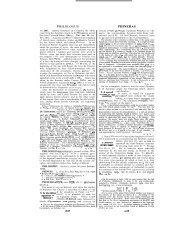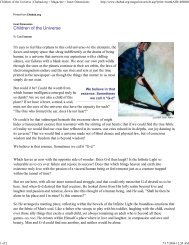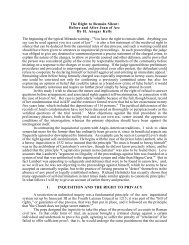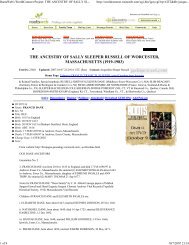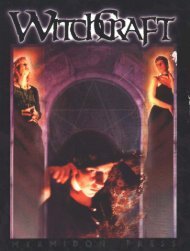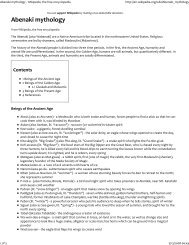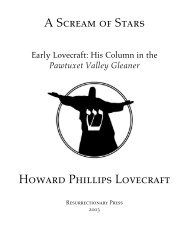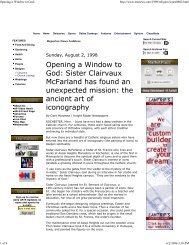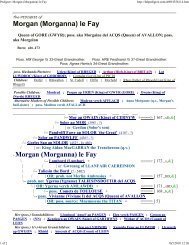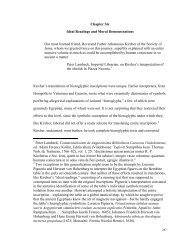Encylodaedia Biblica; a critical dictionary of the literary, political and ...
Encylodaedia Biblica; a critical dictionary of the literary, political and ...
Encylodaedia Biblica; a critical dictionary of the literary, political and ...
Create successful ePaper yourself
Turn your PDF publications into a flip-book with our unique Google optimized e-Paper software.
ZERUBBABEL ZETHAM<br />
killgdoln under <strong>the</strong> Davidic prince Zerubbabel. It is<br />
also held by some that <strong>the</strong>re is evidence <strong>of</strong> this in <strong>the</strong><br />
OT itself. Zechariah (610) mentions <strong>the</strong> arrival at<br />
Jerusalem <strong>of</strong> four Jews from Babylon, who brought gifts<br />
<strong>of</strong> silver <strong>and</strong> gold. Wellhausen thinks that in Zech.<br />
611 <strong>the</strong> text has been deliberately tampered with. The<br />
crown referred to must surely have been for Zerubbabel.<br />
This must ei<strong>the</strong>r hare been expressly stated or implied.<br />
Wellhausen himself is content with omitting <strong>the</strong> words<br />
relative to <strong>the</strong> high priest, Joshua, as ihserted at a time<br />
when <strong>the</strong> high priest was virtually a crowned king ; but<br />
it may also be held that <strong>the</strong> name Joshua has displaced<br />
<strong>the</strong> name Zerubbabel.1 However this may be, <strong>the</strong><br />
sudden disappearance <strong>of</strong> Zerubbabel from <strong>the</strong> <strong>the</strong>atre <strong>of</strong><br />
<strong>political</strong> history is remarkable.2 It has been suggested<br />
that he may have been recalled or even put to death by<br />
<strong>the</strong> Persians, <strong>and</strong> that <strong>the</strong> attempt <strong>of</strong> Tattenai (see<br />
'I'xrxu) <strong>the</strong> satrap <strong>of</strong> Syria to stop <strong>the</strong> building <strong>of</strong> <strong>the</strong><br />
temple may have some connection with this, or may at<br />
any rate imply a suspicion <strong>of</strong> <strong>the</strong> disloyalty <strong>of</strong> <strong>the</strong> Jews.<br />
Later, we find Sanbnllat pr<strong>of</strong>essing that <strong>the</strong>re is a report<br />
that Nehemiah aiiiis at <strong>the</strong> crow-n (Neh. 67). This<br />
report was doubtless erroneous ; but it may plausibly be<br />
supposed to be based on <strong>the</strong> fact that a Jewish pretender<br />
had really come forward in <strong>the</strong> past.3<br />
For <strong>the</strong> fur<strong>the</strong>r development <strong>of</strong> similar ideas see Sellin,<br />
SerubdabeI (1898), where it is supposed that Zerubbabel<br />
is <strong>the</strong> martyr referred to (many think) in Is. 53, <strong>and</strong> <strong>the</strong><br />
same writer's Studien ZUY Entstehung.sgesci5. der Yiid.<br />
(Ameinde nnch denz 6n6. ExiZ, 2 (I~oI), where some<br />
retractations are ma.de, <strong>and</strong> <strong>the</strong> <strong>the</strong>ory is placed on what<br />
appears to <strong>the</strong> writer a more secure basis. Sellin still<br />
holds that Zerubbabel came to a violent end, but no<br />
longer rests this on Is. 53 or on any o<strong>the</strong>r passage <strong>of</strong><br />
<strong>the</strong> OT. Winckler, however, is bolder. He thinks<br />
that both Sheshbazzar <strong>and</strong> Zerubbabel were set aside<br />
by acts <strong>of</strong> <strong>the</strong> Persian authorities, <strong>and</strong> that, whilst Sheshbazzar<br />
was treated gently, Zerubbabel suffered <strong>the</strong><br />
punishment <strong>of</strong> impalement ; <strong>the</strong> eulogium <strong>of</strong> Zerubbabel<br />
is to be found in Is. 53.*<br />
Stade(GP712 127 [18?8l)speaksmorevaguely. ' If<strong>the</strong> supreme<br />
Persian power heard <strong>of</strong> <strong>the</strong> hopes attaching to <strong>the</strong> Persian<br />
governor Zeruhbabel, we cannot wonder that it did not accommodate<br />
itself to <strong>the</strong> role <strong>of</strong> a tree undergoing <strong>the</strong> embrace <strong>of</strong> ivy.'<br />
It is possible. however, that <strong>the</strong>se <strong>the</strong>ories need to<br />
\e revised in <strong>the</strong> light <strong>of</strong> a more thorough criticism<br />
3. a new <strong>of</strong> <strong>the</strong> text <strong>of</strong> <strong>the</strong> OT narratives. The story<br />
suggested underlying Ezra, Nehemiah, <strong>and</strong> <strong>the</strong> early<br />
<strong>the</strong>o~. part <strong>of</strong> Daniel refers, it may be held, to a<br />
N. Arabian captivity <strong>of</strong> <strong>the</strong> Jews <strong>and</strong> to a<br />
subsequent change in <strong>the</strong>ir relations to <strong>the</strong>ir captors.<br />
It is unsafe to place any reliance on <strong>the</strong> proper names<br />
in <strong>the</strong>ir present form. 'niii (for <strong>the</strong> common explanations<br />
<strong>of</strong> which little can be said5) may, like SZ~*N <strong>and</strong><br />
h i , be a corruption (manipulated by <strong>the</strong> redactor) <strong>of</strong><br />
hyny (Ishmael). This has <strong>the</strong> advantage <strong>of</strong> according<br />
with <strong>the</strong> <strong>the</strong>ory, which appears to be well snpported,<br />
that <strong>the</strong> names given in I Ch. 3 19 to <strong>the</strong> sons <strong>of</strong> ' Zerubbabel,'<br />
beginning with Meshullam (=Ishmael), are all<br />
1 Solew. Rei. Life, 15, n. Hitzig supposes a mere ordinary<br />
accident. He would insert <strong>the</strong> words* '<strong>of</strong> Zeruhhabel <strong>and</strong> <strong>of</strong>,'<br />
thus accounting for <strong>the</strong> plural ' crowns. So also Marti (in Kau.<br />
HS).<br />
2 For ano<strong>the</strong>r view see Gu<strong>the</strong>, GVI 248 (Darins's division <strong>of</strong><br />
<strong>the</strong> empire into twenty satrapies, making <strong>the</strong> post at Jerusalem<br />
su erfluoos).<br />
8 So few. Kei. Lif;., 13-16, which was written independently<br />
<strong>of</strong> Sellin's Seru66abel (published in <strong>the</strong> same year 1898).<br />
See SERVANT OF THE LORD. Winckler's <strong>the</strong>ories, as given<br />
in A OF<strong>and</strong> KA T(3J, have passed through several phases. There<br />
is a convenient summary <strong>of</strong> his present conclusions in <strong>the</strong> latter<br />
work. pp. 291.fi<br />
5 ' Sown in Bxhylon'surelycannotmean 'begotten in Babylon.'<br />
Rothstein (Genraiop'e, 65) thinks that <strong>the</strong> name was given to his<br />
son by Pedaiah (=Sheshhazzar) tocommemorate <strong>the</strong> happy turn<br />
in <strong>the</strong> fortiines <strong>of</strong> Israel <strong>and</strong> that <strong>the</strong> return <strong>of</strong> Jewish exiles was<br />
already as good as certjin when <strong>the</strong> child called Zeruhhabel was<br />
horn. Marquart (Fund. 55) however supports <strong>the</strong> view that<br />
Zeruhbahel (Zarubabili?) is a)Bahyloni& name. But <strong>the</strong> name,<br />
as explained above by Johns does not seem at all a likely one<br />
to have been selected'for a JLwish governor.<br />
54'3<br />
corruptions <strong>of</strong> gentilics or ethnics belonging to <strong>the</strong><br />
Negeb. That ' Zerubbabel ' was really a descendant <strong>of</strong><br />
David is possible, but by no means certain,' <strong>and</strong> <strong>the</strong><br />
same may <strong>of</strong> conrse be said <strong>of</strong> Sheshbazzar.2 Even that<br />
<strong>the</strong>y were returned exiles is d~ubtful.~ This is not <strong>the</strong><br />
place to rewrite <strong>the</strong> history <strong>of</strong> this period-or ra<strong>the</strong>r to<br />
collect <strong>the</strong> fragments <strong>of</strong> its history-from <strong>the</strong> new point<br />
<strong>of</strong> view. But we may at any rate suggest that critics <strong>of</strong><br />
Zechariah may have erred in supposing that <strong>the</strong> donors<br />
<strong>of</strong> <strong>the</strong> silver <strong>and</strong> gold mentioned in Zech.698 were<br />
' Babylonian Jews.' These persons appear ra<strong>the</strong>r to<br />
have been foreigners such as are referred to in Is. 60 13,<br />
<strong>and</strong> <strong>the</strong>ir gifts are such ninja (' <strong>of</strong>ferings ') as Haggai<br />
most probably refers to in <strong>the</strong> famous prophecy in Hag.<br />
27. It may still, however, be held that <strong>the</strong> name <strong>of</strong><br />
'Joshua ben Jehozadak' has been substituted for that<br />
<strong>of</strong> ' Zerubbabel' (Ishmael?), <strong>and</strong> <strong>the</strong> view that a movement<br />
arose among <strong>the</strong> Jews in favour <strong>of</strong> ' Zerubbabel '<br />
as Messianic king still appears to have a considerable<br />
degree <strong>of</strong> probability.<br />
Rothstein (Die Genedogie des K8zigs /ojachin IC. seiptetnachkotizmen<br />
in geschichtl. Geleuchtung, rgoz) assumes <strong>the</strong><br />
present form <strong>of</strong> <strong>the</strong> names in I Ch. 3 17-24 to be fairly correct.<br />
Such an emendation as that <strong>of</strong> 'Ohel' into ' Jehaiel'(85) isat any<br />
rate exceptional, <strong>and</strong> even here <strong>the</strong> author assumes a view <strong>of</strong> <strong>the</strong><br />
formation <strong>of</strong> <strong>the</strong> name ' Jehaiel' such as <strong>the</strong> latest editor <strong>of</strong><br />
Chronicles might not have disowned. The <strong>the</strong>ory that 'Zerubbabel'<br />
was <strong>the</strong> son <strong>of</strong> Pedaiah is supported by some new<br />
histprical hypo<strong>the</strong>ses, <strong>the</strong> hasis <strong>of</strong> which, however, needs careful<br />
testing. T. K. C.<br />
ZERUIAH (Yl:lly ; Yl:??, 'one who is perfumed<br />
with storax'? 5 71 ; c&poyl& [BAL]), sister <strong>of</strong> David<br />
(I Ch. 216), <strong>and</strong> mo<strong>the</strong>r <strong>of</strong> JOAB, ABISHAI, <strong>and</strong><br />
ASAHEL.<br />
So at least <strong>the</strong> Chronicler represents ; z S. 17 25 will he considered<br />
presently. It would be strange, however, that in <strong>the</strong><br />
list <strong>of</strong> David's high <strong>of</strong>ficers in 2 S. 8 16-18 Joab should be <strong>the</strong><br />
only one whose mo<strong>the</strong>r's name was substituted for his fa<strong>the</strong>r's.<br />
We have met with many cases in which <strong>the</strong> ethnic origin <strong>of</strong> a<br />
name has been disguised hy <strong>the</strong> addition <strong>of</strong> ;i to <strong>the</strong> gentilic<br />
ending 7. It is <strong>the</strong>refore not improbable that Zeruiah is an<br />
expansion <strong>of</strong> an ethnic namel <strong>and</strong> if so we cannot for a moment<br />
doubt what that name is-it is '?Sp. 11Y <strong>and</strong> 1s are several<br />
times given by an error for 1W-i.e., Mugri in N. Arabia (see<br />
MIZRAIM, 8 2 6), <strong>and</strong> Jeroboam's mo<strong>the</strong>r is, by a similar error,<br />
called ZERUAH (q.u.), instead <strong>of</strong> Migriyah. In 2 S. 2 32 <strong>the</strong><br />
sepulchre <strong>of</strong> Asahel's fa<strong>the</strong>r is said to have been in Bethlehem.<br />
Bethlehem probably comes from Beth-jerahmeel, <strong>and</strong> <strong>the</strong>re was<br />
doubtless a Beth-jerahmeel in <strong>the</strong> Jerahmeelite Negeb ; cp<br />
MICAH, I. It was from this Beth-jerahmeel that Joah prob-<br />
ably came <strong>and</strong> if so we can easily believe that his fa<strong>the</strong>r might<br />
be called '(especially by those who dwelt outside <strong>the</strong> Negeb)<br />
Misri, or Miyite,' ' Jerahmeelite' <strong>and</strong> ' Misrite' being almost,<br />
though not quite, synonymous. In I Ch. 2 54 (RV) we meet<br />
with a place Atroth(ephrath)-heth-joah whose people were 'sons<br />
<strong>of</strong> Salma' (i.e. connrcted with <strong>the</strong> Salmzeans-see SALMAH).<br />
This indirect1y)confirmi <strong>the</strong> view here taken. It would he a<br />
serious ohjection to this if <strong>the</strong> text <strong>of</strong> 2 S. 1725 were correct.<br />
The obscurity <strong>of</strong> <strong>the</strong> passage however (see NAHASH) suggests<br />
doubt. Elsewhere (see Ckt. Gib.) it is proposed to read<br />
Now Amasa was <strong>the</strong> son <strong>of</strong> Ithra an Ishmaelife, who went ii<br />
unto Abigail, <strong>the</strong> daughter <strong>of</strong> Achish, a Misrite.<br />
We can now underst<strong>and</strong> better <strong>the</strong> exclamation ascribed to<br />
David in 2 S. 3 39 '<strong>the</strong>se men <strong>the</strong> sons <strong>of</strong> Miari-i.e. fierce<br />
Migrites by extdtion (MT Zeruiahtare harsher &an I.'<br />
The alternative is to connect >'%with 'R MASTIC (q...), comparing<br />
;i?)!, Zilpah, 'dropping'; see NAMES, g 71. It is true,<br />
Zilpah too admits <strong>of</strong> ano<strong>the</strong>r explanation (cp ZILPAH). What<br />
can have led Josephus to say (Ant. vii. 13) that Joah's fa<strong>the</strong>r<br />
was named uaupr Suri it is difficult to say, unless it be that in<br />
I Ch. 4 14 Joah, "<strong>the</strong> 'fa<strong>the</strong>r <strong>of</strong> Ceharashim' (a corruption <strong>of</strong><br />
Geshurim), is called Seraiah (see SERAIAH, beg.). T. K. c.<br />
ZETHAM (El!, explain as ZETHAN, Z&OM [R],<br />
ZAIB.. zoo. [A], Z H ~ N [L]), a Gershonite Levite;<br />
I Ch. 238 2622.<br />
1 Cp Kosters Hersfez, 473<br />
2 According io <strong>the</strong> <strong>the</strong>ory here advocated, 'Sheshbazzar' is<br />
an alteration <strong>of</strong> a name with N. Arabian affinities. The first<br />
part may, in accordance with sound method, be identified with<br />
ui3. Again <strong>and</strong> again in <strong>the</strong> MT we find wiw <strong>and</strong> DiD written<br />
in error for wi~. The second part may perhaps he a corruption<br />
<strong>of</strong> wn.<br />
3 Cp EZRA-NEHEMIAH, P, 8 ; ISRAEL, B 51 ; <strong>and</strong> cp Zntr. Is.<br />
Prologue, p. xxxviii; Jew. Rel. Life, 6; Kent, Hisf. <strong>of</strong> Ur<br />
Jnuisk PeapZc (Babylonian Period, etc.), 1323<br />
5414



